System Manual: Siemens SIMATIC HMI (WinCCv7.0: Scripting VBS, ANSI-C, VBA)
Подождите немного. Документ загружается.


Alternative operation
Alternatively, the compilation process can be initiated in the following ways:
Select "Compile" from the "Edit" menu, select the "Compile" option from the shortcut menu of
the edit window or use the corresponding keyboard shortcut.
Saving may also be performed in the following ways:
Select "Save" from the "File" menu or use the corresponding key combination.
Display of Actions
If a syntactically incorrect action is stored, it is displayed in the Global Script navigation window
with the icon shown to the left.
If a syntactically correct action is stored with no trigger, it is displayed in the Global Script
navigation window with the icon shown to the left.
If a syntactically correct action is stored with a trigger, it is displayed in the Global Script
navigation window with the icon shown to the left.
See also
Runtime Behavior of Actions (Page 824)
2.13.8 Triggers
2.13.8.1 Triggers
Defining and Using Triggers
Triggers are used to execute actions in Runtime. To do this, a trigger is linked to an action,
forming the triggering event for calling the action. Actions without triggers are not executed.
Trigger Types
The following trigger types are available:
ANSI-C for Creating Functions and Actions
2.13 Creating and Editing Actions
MDM - WinCC: Scripting (VBS, ANSI-C, VBA)
System Manual, 11/2008,
811

Acyclic Triggers
These consist of a specified date and time. The action specified by such a trigger is performed
once at the date and time specified.
Cyclic Triggers
These consist of a specified time interval and starting point. The following types of cyclic
triggers are available:
● Default cycle. The start of the first time interval coincides with the start of Runtime. The
length of the interval is determined by the cycle.
● Hourly. The start of the interval is specified as minutes and seconds. The length of the
interval is an hour.
● Daily. The start of the interval is specified by the time (hours, minutes and seconds). The
length of the interval is a day.
● Weekly. The start of the interval is specified by the day of the week (Monday, Tuesday,
etc.) and the time. The length of the interval is a week.
● Monthly. The start of the interval is specified by the day and time. The length of the interval
is a month.
● Annually. The start of the interval is specified by the day, month and time. The length of
the interval is a year.
Tag Triggers
These consist of the specification of one or more tags. The action associated with such a trigger
is performed each time a change in the value of one of these tags is detected.
How the tag values are queried may be customized for each tag. Either cyclic polling with a
specified period or a reaction as soon as the system detects a change in the tag value may
be selected.
Depending on the choice of query method, it is possible that the tag changes but the system
does not detect this. In this case the action is not performed.
Effect of Triggers on an Action
If the action is associated with only one trigger, then the action is performed as soon as the
triggering event occurs.
However, an action may be associated with multiple triggers, such as a cyclic trigger and a
tag trigger. In this case, the action is performed whenever one of the two triggering events
occurs. If two events occur simultaneously, the action is executed twice in sequence. If two
tag triggers fire at the same time, the action is performed only once.
The processing of an action should be completed before another call of the action occurs, as
there might otherwise be an overflow of the queue.
Tip:If the action is not to be carried out with each event occurrence, then a condition can be
specified
for the action that controls its further course dependent on the event. If the action is
not to be executed any more, it can be terminated with a <value> return.
ANSI-C for Creating Functions and Actions
2.13 Creating and Editing Actions
MDM - WinCC: Scripting (VBS, ANSI-C, VBA)
812
System Manual, 11/2008,
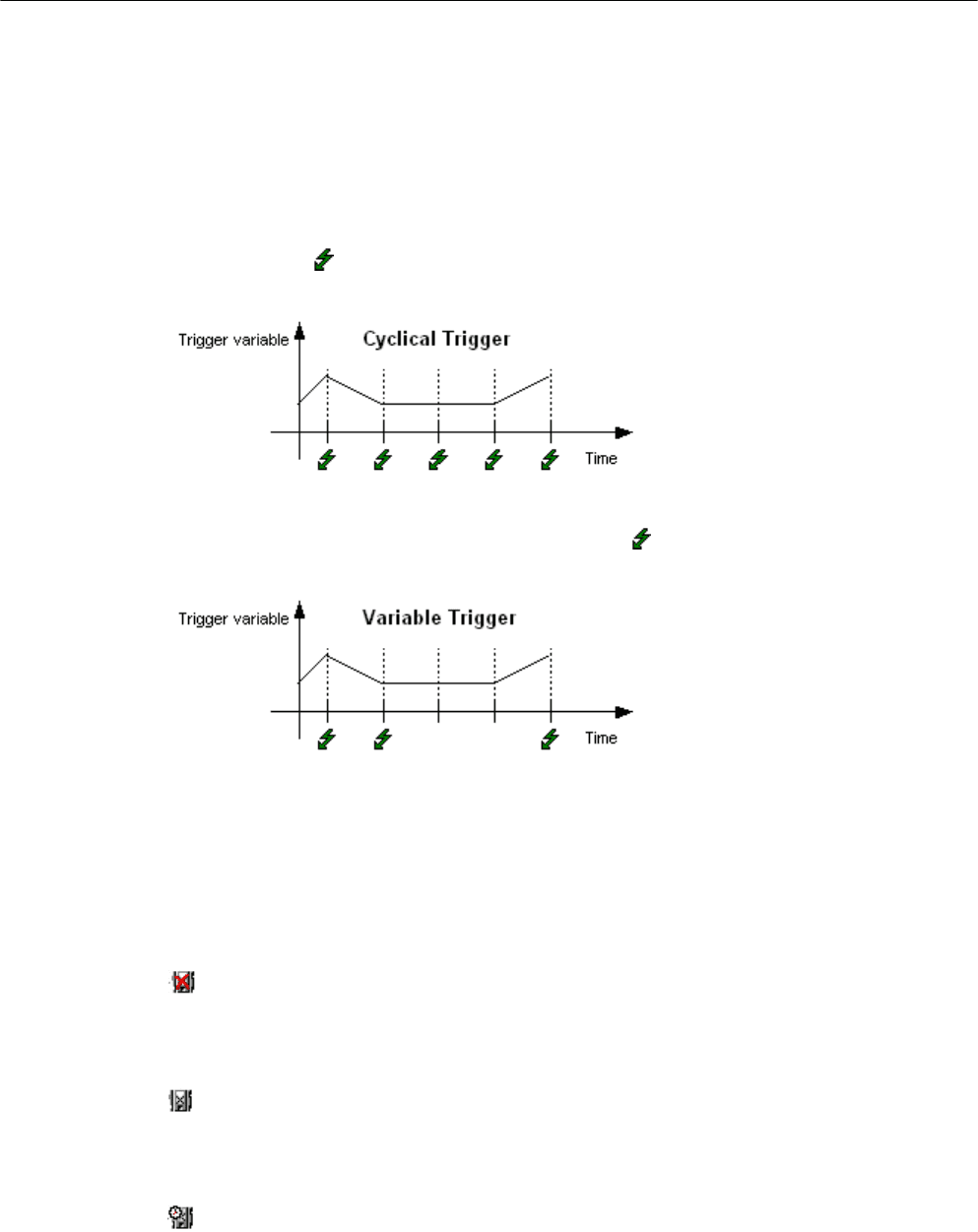
Rules for the Selection of Triggers
Depending on the system, it cannot be guaranteed that an action with a cyclic trigger is carried
out
at exactly the specified time. If this is a requirement, then the task (such as a check, etc.)
must be implemented on the automation device.
For processing, tag triggers have priority over cyclic triggers.
● For a cyclic trigger, the action is always performed when the trigger event occurs, e.g. every
20 seconds. (
= action is performed)
● The tag trigger only causes the action to be performed if the value of the trigger tag has
changed. This is done to reduce the system load ( = action is performed).
The values of tags contained in the trigger are already known when the action begins. The
GetTag() call can be used to access the value directly. Processing is much faster than for
trigger tags than for those not contained in the trigger whose values must be obtained via
GetTag() requests.
Display of Actions
If a syntactically incorrect action is stored, it is displayed in the Global Script navigation window
with the icon shown to the left.
If a syntactically correct action is stored with no trigger, it is displayed in the Global Script
navigation window with the icon shown to the left.
If a syntactically correct action is stored with a trigger, it is displayed in the Global Script
navigation window with the icon shown to the left.
ANSI-C for Creating Functions and Actions
2.13 Creating and Editing Actions
MDM - WinCC: Scripting (VBS, ANSI-C, VBA)
System Manual, 11/2008,
813

See also
How to Delete a Trigger (Page 818)
How to Change a Trigger (Page 817)
How to Add a New Trigger of the "Tag" Type (Page 815)
How to Add a New Trigger of the "Timer" Type (Page 814)
2.13.8.2 How to Add a New Trigger of the "Timer" Type
Introduction
Triggers are used to execute actions in Runtime. To do t his, a trigger is linked to an action,
forming the triggering event for calling the action. Actions without triggers are not executed.
"Timer" type triggers can be cyclic or acyclic triggers.
Acyclic triggers consist of a specified date and time. The action specified by such a trigger is
performed once at the date and time specified.
Cyclic triggers consist of a specified time interval and starting point. The following types of
cyclic triggers are available:
● Default cycle. The start of the first time interval coincides with the start of the Runtime
system. The length of the interval is determined by the cycle.
● Hourly. The start of the interval is specified as minutes and seconds. The length of the
interval is an hour.
● Daily. The start of the interval is specified by the time (hours, minutes and seconds). The
length of the interval is a day.
● Weekly. The start of the interval is specified by the day of the week (Monday, Tuesday,
etc.) and the time. The length of the interval is a week.
● Monthly. The start of the interval is specified by the day and time. The length of the interval
is a month.
● Annually. The start of the interval is specified by the day, month and time. The length of
the interval is a year.
Requirement
The action to be linked with a trigger must be open in the active edit window.
Procedure
1.
Click the button in the editing toolbar. The "Properties" dialog is opened.
2. Select the "Trigger" tab.
3. Select the trigger source "Timer" and click the "Add" button.
ANSI-C for Creating Functions and Actions
2.13 Creating and Editing Actions
MDM - WinCC: Scripting (VBS, ANSI-C, VBA)
814
System Manual, 11/2008,
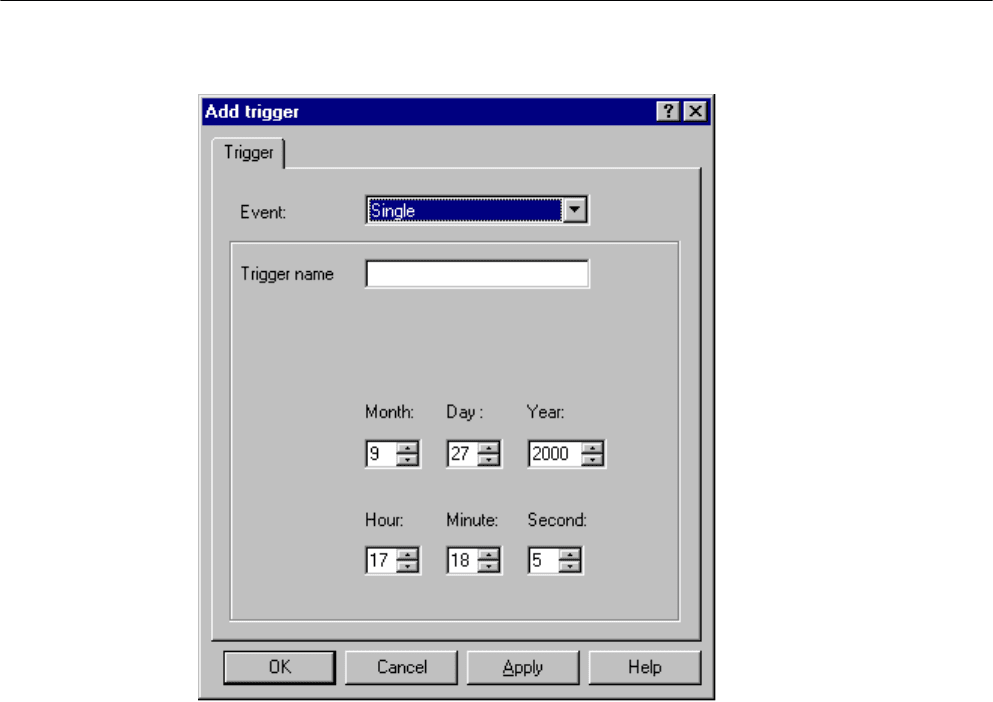
4. Select "Single" to add an acyclic trigger or select a cycle to add a cyclical trigger.
5. Complete the required details in the dialog.
6. Confirm the entries by clicking "OK".
7. Close the "Properties" dialog by clicking "OK".
Alternative operation
Alternatively, the "Properties" dialog can be opened as follows:
In the "Edit" menu, select "Info", select "Info / Trigger" in the shortcut menu of the edit window,
or use the corresponding key combination.
2.13.8.3 How to Add a New Trigger of the "Tag" Type
Introduction
Triggers are used to execute actions in Runtime. To do this, a trigger is linked to an action,
forming the triggering event for calling the action. Actions without triggers are not executed.
Tag triggers consist of one or more specified tags. The action associated with such a trigger
is performed each time a change in the value of one of these tags is detected.
How the tag values are queried may be customized for each tag. Either cyclic polling with a
specified period or a reaction as soon as the system detects a change in the tag value may
be selected.
ANSI-C for Creating Functions and Actions
2.13 Creating and Editing Actions
MDM - WinCC: Scripting (VBS, ANSI-C, VBA)
System Manual, 11/2008,
815
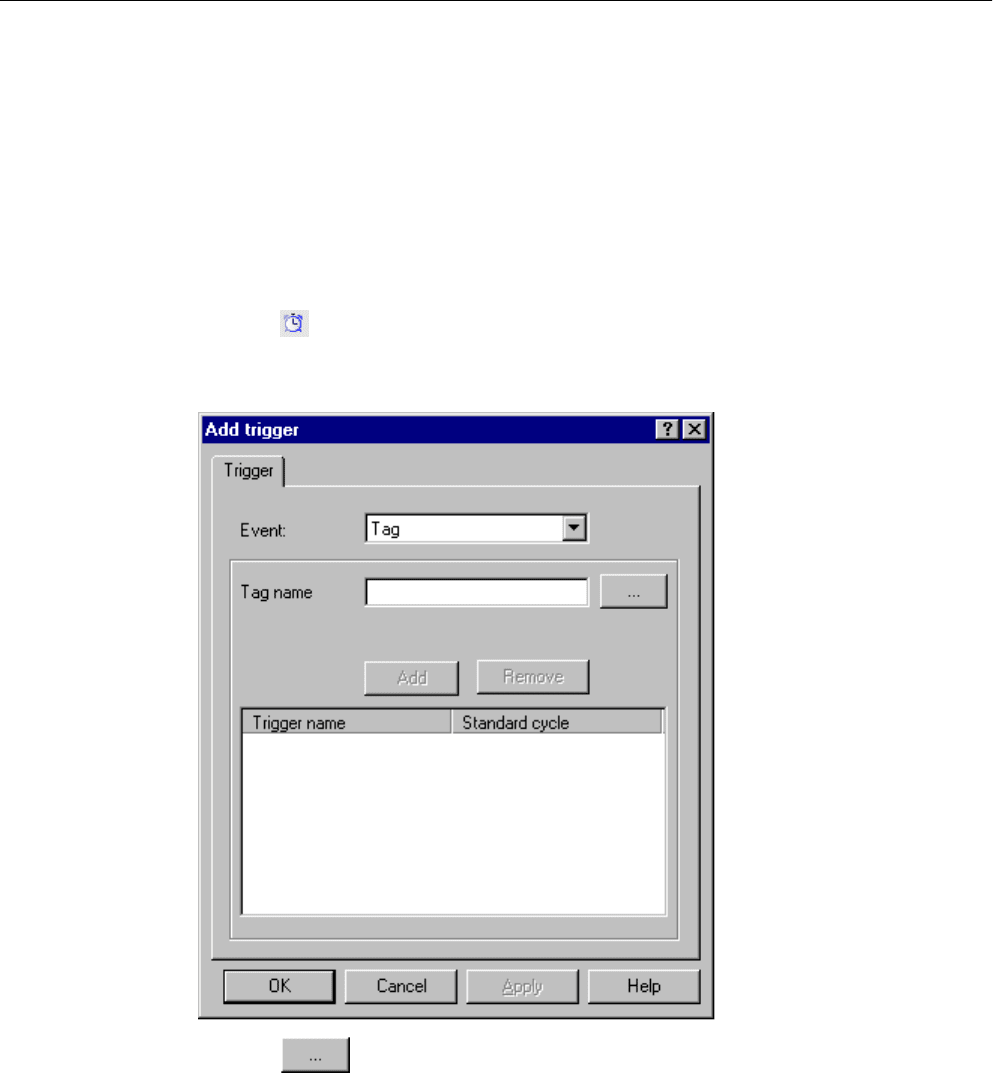
Depending on the choice of query method, it is possible that the tag changes while the system
fails to detect this. In this case the action is not performed.
Requirement
The action to be linked with a trigger must be open in the active edit window.
Procedure
1.
Click the button in the editing toolbar. The "Properties" dialog is opened.
2. Select the "Trigger" tab.
3. Select the trigger source "Tag" and click the "Add" button. The "Add Tags" dialog is opened.
4.
Click the button to open the tag selection dialog, select a tag and confirm your
selection by clicking "OK".
5. In the "Add Trigger" dialog, open the shortcut menu in the "Standard cycle" column and
then
select the desired monitoring cycle. Selecting "After Every Change" results continuous
monitoring.
6. Repeat steps 4 and 5, if you want add more tags.
7. Confirm the entries by clicking "OK".
8. Close the "Properties" dialog by clicking "OK".
ANSI-C for Creating Functions and Actions
2.13 Creating and Editing Actions
MDM - WinCC: Scripting (VBS, ANSI-C, VBA)
816
System Manual, 11/2008,

Alternative operation
Alternatively, the "Properties" dialog can be opened as follows:
In the "Edit" menu, select "Info", select "Info / Trigger" in the shortcut menu of the edit window,
or use the corresponding key combination.
In the "Add Trigger" dialog, you can also enter a tag name directly and insert the tag in the
"Trigger Name" column by clicking "Add". With this approach, the system does however not
check whether the tag exists.
2.13.8.4 How to Change a Trigger
Introduction
Triggers that have been defined can be changed at any time. They can also be changed in
Runtime.
Requirement
The relevant action must be opened in the edit window.
ANSI-C for Creating Functions and Actions
2.13 Creating and Editing Actions
MDM - WinCC: Scripting (VBS, ANSI-C, VBA)
System Manual, 11/2008,
817
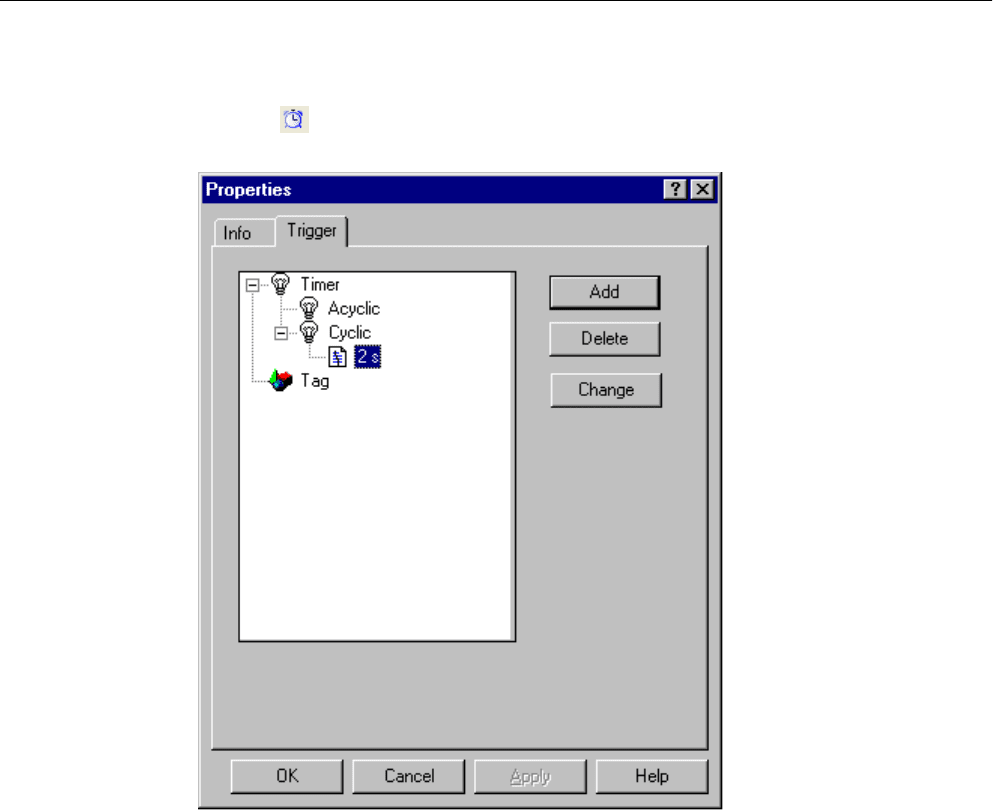
Procedure
1.
Click the button in the editing toolbar. The "Properties" dialog is opened.
2. Select the "Trigger" tab and select the trigger you wish to change.
3. Click the "Change" button to open the "Change Trigger" dialog.
4. Make the desired changes.
5. Confirm the entries by clicking "OK".
6. Close the "Properties" dialog by clicking "OK".
Alternative operation
Alternatively, the "Properties" dialog can be opened as follows:
In the "Edit" menu, select "Info", select "Info / Trigger" in the shortcut menu of the edit window,
or use the corresponding key combination.
2.13.8.5 How to Delete a Trigger
Introduction
Triggers that have been defined can be deleted at any time. They can also be deleted in
Runtime.
ANSI-C for Creating Functions and Actions
2.13 Creating and Editing Actions
MDM - WinCC: Scripting (VBS, ANSI-C, VBA)
818
System Manual, 11/2008,
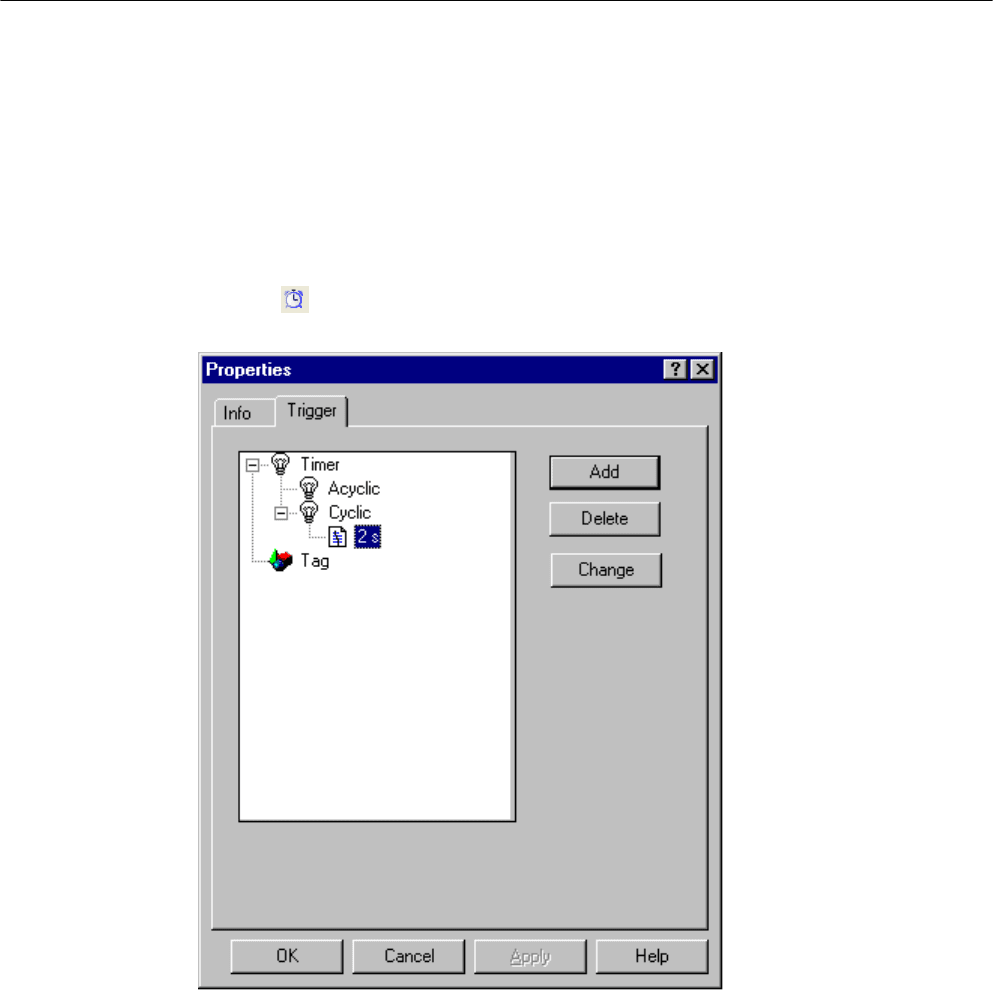
If a trigger is deleted in Runtime, it only takes effect after the action is saved.
Requirement
The relevant action must be opened in the edit window.
Procedure
1.
Click the button in the editing toolbar. The "Properties" dialog is opened.
2. Select the "Trigger" tab and select the trigger you wish to delete.
3. Delete the selected trigger by clicking "Delete".
4. Close the "Properties" dialog by clicking "OK".
Alternative operation
Alternatively, the "Properties" dialog can be opened as follows:
In the "Edit" menu, select "Info", select "Info / Trigger" in the shortcut menu of the edit window,
or use the corresponding key combination.
ANSI-C for Creating Functions and Actions
2.13 Creating and Editing Actions
MDM - WinCC: Scripting (VBS, ANSI-C, VBA)
System Manual, 11/2008,
819
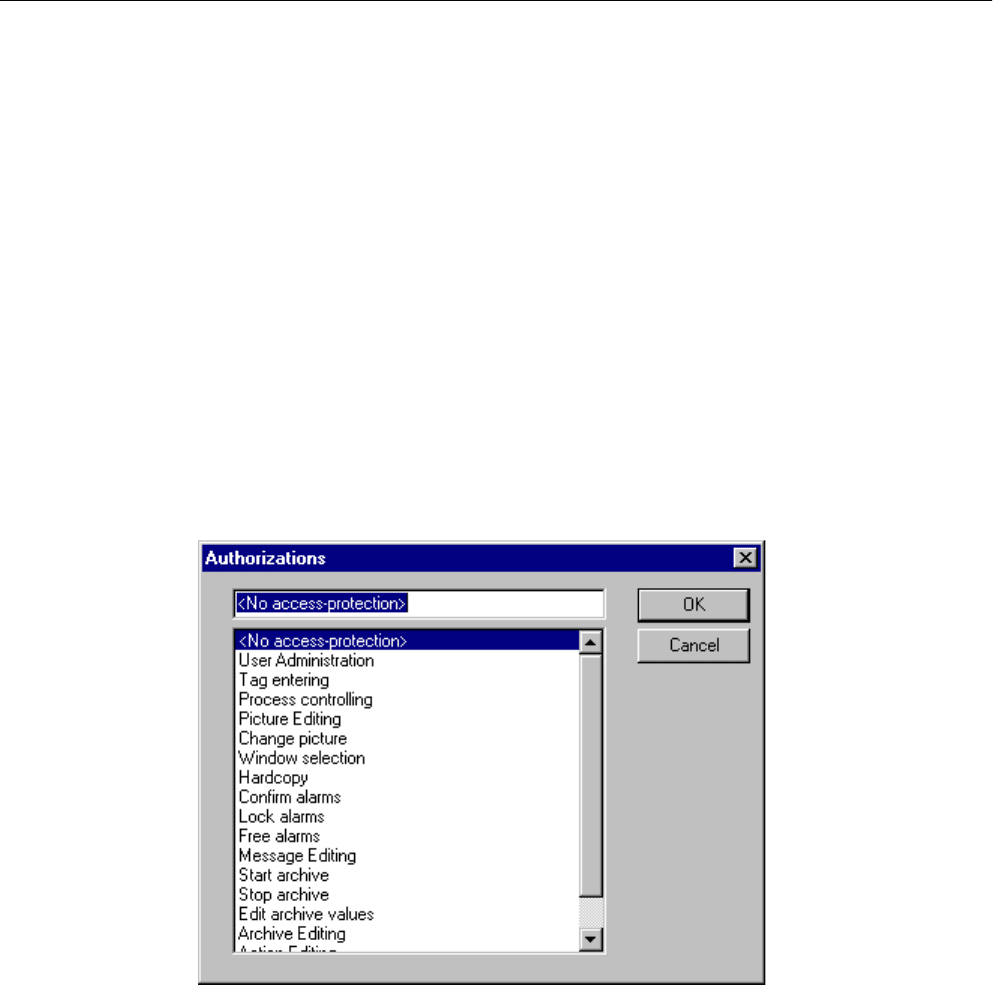
2.13.9 How to Assign Authorizations
Introduction
With the Global Script - Runtime diagnostic tool, you can influence the processing of actions
in
Runtime. Each action can be assigned an authorization. This authorization only effects the
operation in the Global Script - Runtime window.
Requirement
The relevant action must be opened in the edit window.
Procedure
1. Select the "Operator authorization" command in the "Edit" menu.
The "Authorizations" dialog box is opened.
2. Select an authorization.
3. Confirm your selection with "OK".
See also
GSC Runtime (Page 825)
ANSI-C for Creating Functions and Actions
2.13 Creating and Editing Actions
MDM - WinCC: Scripting (VBS, ANSI-C, VBA)
820
System Manual, 11/2008,
